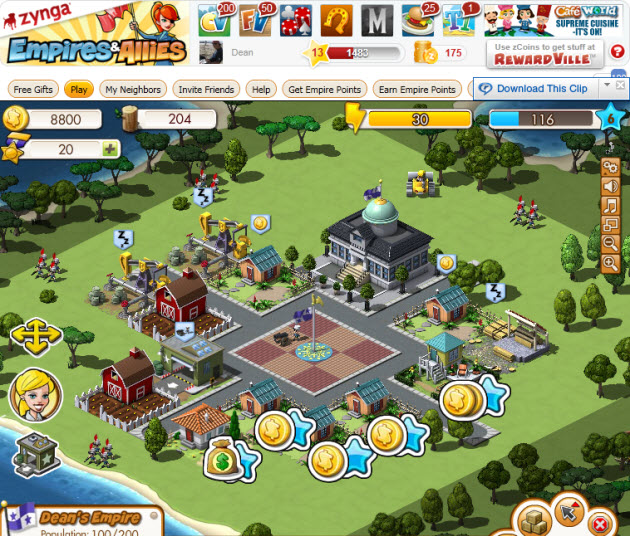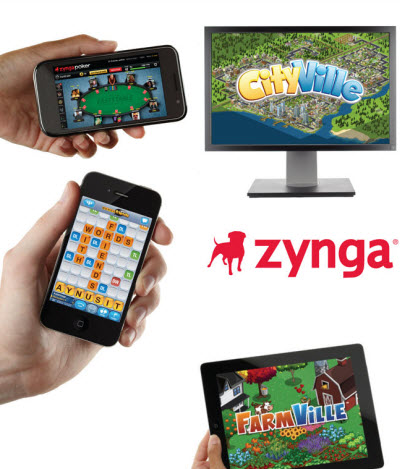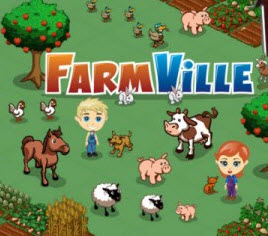 Social games maker Zynga, the developer behind smash hits like FarmVille and CityVille, filed for an initial public offering on Friday, according to a filing with the Securities and Exchange Commission.
Social games maker Zynga, the developer behind smash hits like FarmVille and CityVille, filed for an initial public offering on Friday, according to a filing with the Securities and Exchange Commission.
Zynga has since become a Facebook distribution powerhouse like no other game company. That makes it a lot easier for Zynga to generate revenue, since a percentage of users usually pays for items in otherwise free games. The company has delivered hit after hit to Facebook, including FarmVille and CityVille. The company plans to raise $1 billion in an IPO, at least as an initial amount that could change with the actual IPO. That would put the company’s value at $10 billion, less than previously reported rumors of a $20 billion valuation.
 The filing suggests that the good times are back again in Silicon Valley. More than 80 tech companies have filed to go public, and companies such as LinkedIn and Yandex have paved the way with successful IPOs, even in the face of uncertainty with the world economy. There is pent-up demand for social game investments since investors haven’t had a chance to participate in rapidly growing companies. Zynga is part of a bunch of Web 2.0 darling companies that also include Groupon, Facebook, Twitter and others. If they all eventually go public, the wealth creation will boggle the mind. But these same companies have set off fears of a bubble in technology that could burst in similar fashion to the dotcom collapse of 2000-2001, which resulted in a “nuclear winter” for tech investments.
The filing suggests that the good times are back again in Silicon Valley. More than 80 tech companies have filed to go public, and companies such as LinkedIn and Yandex have paved the way with successful IPOs, even in the face of uncertainty with the world economy. There is pent-up demand for social game investments since investors haven’t had a chance to participate in rapidly growing companies. Zynga is part of a bunch of Web 2.0 darling companies that also include Groupon, Facebook, Twitter and others. If they all eventually go public, the wealth creation will boggle the mind. But these same companies have set off fears of a bubble in technology that could burst in similar fashion to the dotcom collapse of 2000-2001, which resulted in a “nuclear winter” for tech investments.
The filing and eventual IPO will likely change the video game business for good. Zynga will raise a war chest that will make it a force to be reckoned with; rivals such as Electronic Arts, which has a lower $7 billion valuation even though it has been around since 1982, will find themselves at war with a financial powerhouse. If it wasn’t already obvious, Zynga is spelling out to all video game workers that the quickest path to riches (assuming the IPO is successful) is through social games, which are casual games that you play with friends on social networks, rather than hardcore console games. (This is likely why Zynga was able to hire John Schappert, the No. 2 executive at EA, as its chief operating officer).
But Zynga’s success isn’t necessarily going to kill hardcore console games, which feature much higher quality and production values. That’s because Zynga is reaching new audiences that haven’t played games before. Theoretically, Zynga could help traditional game companies because it recruits non-gamers and turns them into casual gamers. Eventually, those casual gamers could become hardcore gamers. Overall, the game market itself is expanding. It’s at $50 billion and it is grabbing more and more of the $1 trillion worldwide entertainment market, according to market researcher IDC.
 Zynga is one of the primary beneficiaries of what it calls the “app economy,” or programs that sit on top of platforms such as Facebook’s social network. Zynga’s latest social game, Empires and Allies, has been a big hit for the company. It attracted more players than Farmville, its first breakout hit, in just 25 days. Empires and Allies is gaining new users at a rate of a million a day and 8 million a week now, according to AppData. Some of the data with the company’s filing reveals Zynga’s stats for the first time.
Zynga is one of the primary beneficiaries of what it calls the “app economy,” or programs that sit on top of platforms such as Facebook’s social network. Zynga’s latest social game, Empires and Allies, has been a big hit for the company. It attracted more players than Farmville, its first breakout hit, in just 25 days. Empires and Allies is gaining new users at a rate of a million a day and 8 million a week now, according to AppData. Some of the data with the company’s filing reveals Zynga’s stats for the first time.
Zynga’s S1 says that in four years, the company has generated more than $1.5 billion in bookings and it has amassed $995.6 million in cash. Its players create and store more than 38,000 virtual itmes every second and spend 2 billion minutes a day with the service. The company has 2,268 employees, an audience of 148 million monthly unique users in 166 countries, and more than 232 million monthly active users (as some users play more than one game). On a daily basis, Zynga has 62 million daily active users, up from 24 million in September 2009. That’s far more than any other social game company on Facebook and a reason why Zynga’s IPO is so highly anticipated. Those users interact with each other 416 million times a day.
Every day, Zynga processes 15 terabytes of game data every day. Unlike traditional game publishers, Zynga can get feedback on how users are playing its games almost instantaneously and it can tweak the games so that they are more engaging and fun. That trial-and-error approach has begun to proliferate through the whole game industry.
Zynga games have been the most popular titles on Facebook since 2009, a reflection of the fact that the company — founded by startup veteran Mark Pincus — had an earlier start than other game makers and figured out how to make money early on through the free-to-play game model. With that model, users play for free and pay real money for virtual goods such as tractor fuel in FarmVille. Zynga now has the top five games on Facebook. It has also expanded into mobile games with an acquisition that gave it Words With Friends. The company has averaged one acquisition per month in the past year.
Zynga said that 64 percent of its employees have been on board for less than a year, and 92 percent for less than two years. That’s a reflection of its breakneck pace and managing growth is listed as one of its risk factors. Zynga’s research and development costs grew from $12.1 million in 2008 to $149.5 million in 2010. Sales and marketing costs grew from $10.9 million in 2008 to $114.2 million in 2010.
 For the first quarter of 2011, Zynga reported revenue of $235.4 million, up more than double from $100.9 million a year earlier. Net income was $11.8 million, up from $6.4 million a year earlier. In 2008, Zynga’s bookings have grown from $35.9 million to $838.9 million in 2010. Earnings before income taxes, depreciation and amortization grew from $4.5 million in 2008 to $392.7 million in 2010. The company has had net income for five quarters in a row.
For the first quarter of 2011, Zynga reported revenue of $235.4 million, up more than double from $100.9 million a year earlier. Net income was $11.8 million, up from $6.4 million a year earlier. In 2008, Zynga’s bookings have grown from $35.9 million to $838.9 million in 2010. Earnings before income taxes, depreciation and amortization grew from $4.5 million in 2008 to $392.7 million in 2010. The company has had net income for five quarters in a row.
The latest numbers show that while Zynga is making a lot of revenue, it’s also spending a huge amount of money as it hires employees and expands to new markets around the world and beyond Facebook. One of Zynga’s big risks is its dependence on Facebook, which now through its virtual currency Facebook Credits takes 30 percent of every Zynga virtual goods transaction) and so it has been diversifying for more than a year.
Zynga has used very little of its cash hoard to buy companies so far. While it acquired a number of game studios in 2010, it only spent $62.3 million in cash on the deals. That makes sense since the value of small game studios has been pretty low.
From 2007 to 2009, Zynga saw fast growth from $693,000 in revenue to $121.5 million. During that time, its losses per year mounted from $846,000 to $52.8 million. That prompted the company to raise a lot of venture capital. The company turned that around in mid-2009 with the launch of FarmVille, which grew to huge numbers of users — as much as 83 million monthly active users. In 2010, net income was $90.6 million. Now, each new game that Zynga launches is a hit in part because it can market those new games to all of its existing users, who can pass it along to friends in a viral fashion.
Zynga notes there are low barriers to entry and lots of competition. Among the rivals are Electronic Arts/Playfish, Disney/Playdom, Crowdstar, Popcap Games, Vostu, and Wooga. In addition, there are social game rivals such as Tencent in China. Potential rivals that might develop social games are Amazon, Facebook, Googke, Microsoft and Yahoo. In mobile, the competitive field is even more expansive.
The IPO will be managed by Morgan Stanley, Goldman Sachs Group, Bank of America Merrill Lynch, Barclays Capital, JP Morgan Chase, and Allen & Co. Zynga didn’t say exactly how many shares it would sell or at what price. On the secondary market SharesPost, Zynga is valued at $15 billion.
Matthew Lynley contributed to this report.
 We’ll be exploring the most disruptive game technologies and business models at our third annual GamesBeat 2011conference, on July 12-13 at the Palace Hotel in San Francisco. It will focus on the disruptive trends in the mobile games market. GamesBeat is co-located with our MobileBeat 2011conference this year. To register, click on this link.
We’ll be exploring the most disruptive game technologies and business models at our third annual GamesBeat 2011conference, on July 12-13 at the Palace Hotel in San Francisco. It will focus on the disruptive trends in the mobile games market. GamesBeat is co-located with our MobileBeat 2011conference this year. To register, click on this link.
VentureBeat's mission is to be a digital town square for technical decision-makers to gain knowledge about transformative enterprise technology and transact. Learn More
